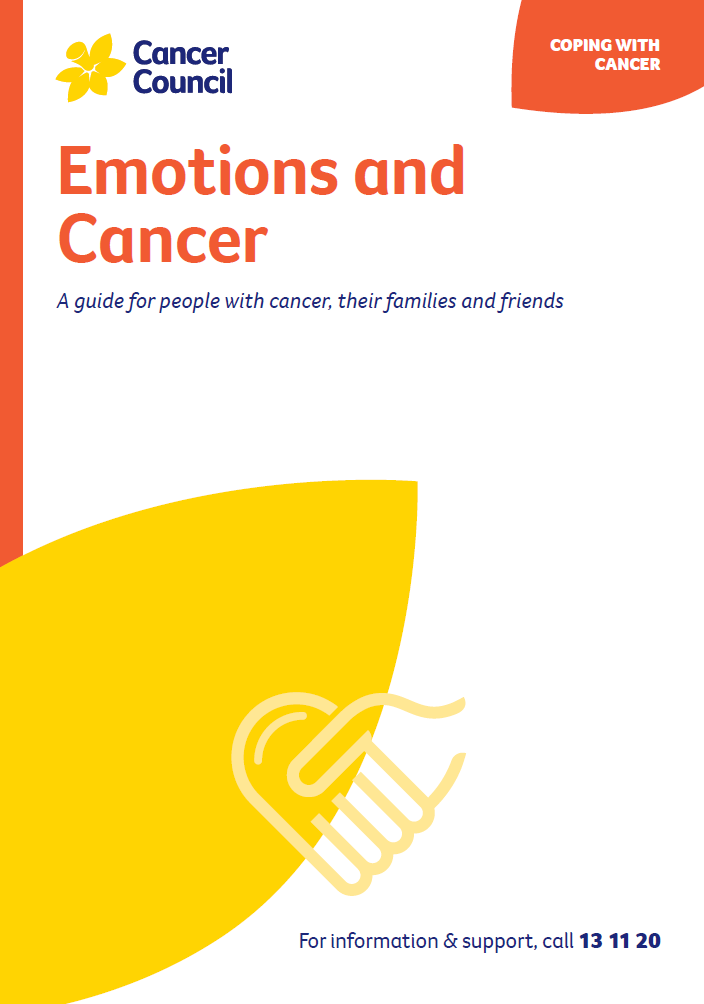- Home
- About Cancer
- Coping with a diagnosis
- Emotions and cancer
- Common reactions
- Physical side effects and emotions
Physical side effects and emotions
The physical and emotional effects of cancer and its treatment can influence each other. Let your treatment team know if you have any new or ongoing side effects.
| pain and fatigue | Cancer does not always cause pain, but if it does, tell your treatment team, as there are ways to relieve pain. The most common treatment side effect is fatigue – feeling exhausted and lacking energy for usual activities. Fatigue differs from normal tiredness as it usually doesn’t go away with rest or sleep. This feeling can also be a symptom of depression. Learn more about pain and cancer and listen to our podcasts on Managing Cancer Pain and Managing Cancer Fatigue. |
| appetite changes | Your appetite might change if you feel unwell, anxious or depressed, or because of the physical effects of cancer treatment. Some people lose their appetite, while others find they eat more. A change in your appetite or weight can leave you feeling distressed. Learn more about nutrition and cancer, mouth health and taste and smell changes, and listen to our podcast Appetite Loss and Nausea. |
| appearance changes | Cancer treatments can cause changes to your appearance, such as hair loss or loss of a body part. Whether these changes are temporary or permanent, they can affect the way you feel about yourself (your self-esteem) and leave you feeling self-conscious and less confident. See Hair loss, and call 13 11 20 to find out about wig services. You can also contact Look Good Feel Better on 1800 650 960 for a free workshop on appearance-related side effects. |
| sexual health | Certain cancer treatments directly affect the body’s sexual organs or hormone balance, but any cancer treatment can reduce your interest in sex. You may feel tired and unwell, or you may be too worried to think about sex. You might also feel less confident about your body. A low sex drive (libido) can also be a symptom of depression. Libido often improves after treatment finishes, but for some people the effect is ongoing. Learn more about sexuality, intimacy and cancer and listen to our podcast on Sex and Cancer. |
| fertility issues | Some cancer treatments affect the reproductive organs, which may lead to temporary or permanent infertility. This means it may no longer be possible to conceive a child. You may feel devastated if you are unable to have children and may worry about how it will affect your relationship or future relationships. You may also feel a sense of loss even if your family is complete or you were not planning to have children. Learn more about fertility and cancer. |
| thinking and memory changes | Some people diagnosed with cancer notice changes in the way they think and remember information. This is often called “chemo brain”, but it can happen even if you don’t have chemotherapy. It is also known as “brain fog” or “cancer-related cognitive impairment”. These changes are often temporary and get better with time, but they can have a big impact on your emotional wellbeing. Learn more about changes in thinking and memory or listen to our podcast on Brain Fog and Cancer below. |
Podcast: Brain Fog and Cancer
Listen to more episodes from our podcast for people affected by cancer
Video: How to eat well after a cancer diagnosis
Video: Coping with emotions after a cancer diagnosis
More resources
Dr Michael Murphy, Psychiatrist, NSW Health, and Conjoint Senior Lecturer, UNSW, NSW (clinical review); A/Prof Anne Burke, Co-Director, Psychology and Allied Health Lead, Cancer, Central Adelaide Local Health Network and The University of Adelaide, SA; Hannah Chen, Psychologist, Cancer Council Queensland; Hazel Everett, Clinical Nurse Consultant, Cancer Services, St John of God Subiaco Hospital, WA; Shona Gates, Senior Social Worker, North West Cancer Centre, TAS; Dr Jemma Gilchrist, Senior Clinical Psychologist, Mind My Health and Crown Princess Mary Cancer Centre, Westmead, NSW; Sandra Hodge, Consumer; Dr Michael Murphy (see above); Caitriona Nienaber, 13 11 20 Consultant, Cancer Council WA; Dr Alesha Thai, Medical Oncologist, Peter MacCallum Cancer Centre, VIC; Alan White, Consumer.
View the Cancer Council NSW editorial policy.
View all publications or call 13 11 20 for free printed copies.

